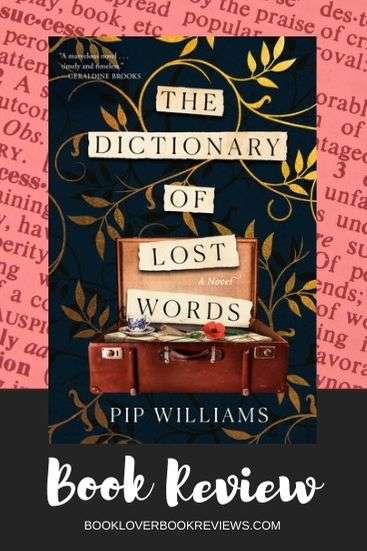The Dictionary of Lost Words, Review: Thought-provoking
The Dictionary of Lost Words by Pip Williams is moving, thought-provoking historical fiction based on real people and events that shaped society. Read my book summary and review.

The Dictionary of Lost Words Book Synopsis
Motherless Esme, grows up in Oxford’s Scriptorium, where her father and fellow lexicographers compile the very first Oxford English Dictionary.
As a very small child playing beneath the word sorting table, Esme discovers words that have been discarded by the men above and begins collecting them. Many of these discarded words relate to the experiences of women and the working classes. As she grows up, Esme realizes the importance of these overlooked words and sets out to create her own dictionary, the Dictionary of Lost Words.
Esme’s enlightenment and coming of age is set against the backdrop of the women’s suffrage movement and World War I. Exploring themes of language, history, and empowerment, this literary fiction was inspired by true events. It is a book that celebrates the power of words to shape our understanding of the world.
Publisher: Penguin Random House, April 2021; First published by Affirm Press in March 2020)
Genre: Historical, Literature, Drama, Romance
Disclosure: If you click a link in this post we may earn a small commission to help offset our running costs.
Sign up to our Booklover Book Reviews emails and receive our gift for new subscribers. LEARN MORE >>
My Review
In this highly perceptive and nuanced historical fiction based on fact, Pip Williams honours the quiet industry, resilience and invaluable contribution of all those who, for whatever reason, are under-appreciated by society.
Reportedly, Williams’ novel inspiration was born from “two simple questions. Do words mean different things to men and women? And if they do, is it possible that we have lost something in the process of defining them?”.
I found lead character Esme’s vividly authentic mix of intellectual curiosity and quiet insecurities beguiling. Her reverence and love for words and their variant meanings comparable to Liesel Meminger’s in The Book Thief.
Some words are more than letters on a page, don’t you think? They have shape and texture. They are like bullets, full of energy, and when you give one breath you can feel its sharp edge against your lip.
But she is far from the only character within The Dictionary of Lost Words that readers will grow immensely fond of, and dare I say uncommonly attached to. The emotional honesty shared between the characters brought to life on these pages (female and male) will have even the most stoic reaching for tissues.
“Me needlework will always be here,” she said. “I see this and I feel…well, I don’t know the word. Like I’ll always be here.”
Literary themes
By illuminating and deeply personalising the societal and structural context within which historical records were produced, Williams explores both their value and inherent bias. It reminds us of the power of words, to harm and control, but also to bridge gaps, to empower and to bring about change for the better.
The beauty of The Dictionary of Lost Words is it elevates the contributions of women without villainising or deriding the contributions of men. It heroes common kindness; not as an act of charity, but one of respect for every individual’s value no matter their gender or birth.
Astute, highly topical and memorable debut fiction from Pip Williams.
BOOK RATING: The Story 4.5 / 5 ; The Writing 4.5 / 5 – Overall 4.5
Get your copy of The Dictionary of Lost Words from:
Amazon Bookshop US Booktopia AURelated reading:
What other readers thought of The Dictionary of Lost Words
- Book Reporter calls it a charismatic story for word lovers and linguists.
- The cast of richly realised characters and relationships caught the attention of the Sydney Morning Herald.
- One of my favourite authors Geraldine Brooks (People of the Book) called it a ‘marvelous fiction about the power of language to elevate or repress’.
- The Conversation urged readers to not rush through The Dictionary of Lost Words, but to savour its heart-wrenching detail.
- In her review, FloraSkates highlighted just how many of the people, places, and events featured in this novel are based in truth.
- Booklist, called it an imaginative love letter to dictionaries.
- Brittany of Shelf Reflection found The Dictionary of Lost Words less pleasing to read, citing some of the profanity contained and its length.
Screen Adaptations
It has been reported that Lisa Scott (Highview Productions) and Rebecca Summerton (Closer Productions) will adapt the book into a television series, with Pip Williams playing an executive producer role. This screen deal follows the stage adaptation of The Dictionary of Lost Words by the SA State Theatre Company and the Sydney Theatre Company, which premiered in Adelaide in September 2023 before showing at the Sydney Opera House in October 2023.
About the Author, Pip Williams
- UK-born Pip Williams grew up in Sydney, and now lives in South Australia.
- Written a memoir of her family’s travels in search of the good life, One Italian Summer.
- Career spent as a social researcher, and this novel is based on her original research in the Oxford English Dictionary archives.
- Check out Pip William’s website.
This review counts toward my participation in the Aussie Author Challenge 2021 and the 2021 Australian Women Writers Challenge.
